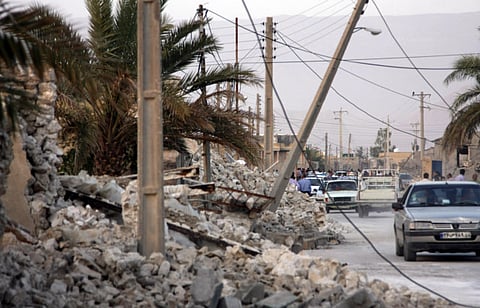Earthquake increases worry over nuclear Iran
Gulf officials urge Iran to be transparent amid concerns fuelled by deadly quake near nuke plant

Manama: Gulf officials and experts have asked Iran to come clean about its nuclear programme amid growing concerns fuelled by Tuesday’s earthquake close to the Bushehr nuclear power station
“It is difficult to reduce the probability of risks related to the Iranian nuclear programme in light of the uncertainty surrounding the issue and the level of Tehran’s compliance with international standards and requirements,” Waheeb Al Nasser, professor of applied physics at the University of Bahrain, said.
“The earthquake that hit Bushehr occurred in a seismically active area and was around 80 kilometres from Bushehr. We are not against Iran’s nuclear activities in peaceful domains, but there are serious concerns about the facilities and their equipment, especially that the Iranian nuclear issue is shrouded in mystery and the international community has been left with many unanswered questions,” he said in Manama.
Al Nasser said that several countries were engaged in nuclear activities, but added that they were transparent about them.
“Besides, even though these countries are well equipped to deal with possible disasters, they invariably take earthquakes and seismic activities into their consideration. We also saw how Japan, a very advanced country, dealt with a possible catastrophe related to leaks of radioactive contaminated water following the 2011 earthquake. The issue today is whether Iran is capable of tackling any environment catastrophe when there is so much mystery about its nuclear programme. The International Atomic Energy Agency (IAEA) has a huge responsibility here, especially that the nuclear plant is in an active seismic location,” he said.
Gulf nationals have been wary for years of the possible fallout of a nuclear plant disaster in Bushehr, across from their countries.
In Kuwait City, environment expert Ilham Al Lingawi said that the Iranian nuclear plant “becomes even more dangerous when there is an earthquake.”
“Any earthquake that measures more than 4.5 degrees compounds the risks and disasters associated with the Busheher nuclear plant,” she said, quoted by local Arabic daily Al Rai on Wednesday. “The earthquake on Tuesday could cause fissures in the infrastructure and result in radioactive leaks that would contaminate the water and the air. This is very dangerous for Kuwait and the Gulf states that rely heavily on the desalination of water. This simply means a catastrophe.”
Kuwait should boost its environment and health protection programmes and increase awareness among residents to help tackle possible risks, Ilham said.
Gulf officials said that Iran should help ease tension and concerns by complying with international standards.
In The Hague where he is attending the Sixth Non-Proliferation and Disarmament Initiative (NPDI), a ministerial-level group initiated by Australia and Japan, Shaikh Abdullah Bin Zayed Al Nahyan, the Foreign Minister, urged Iran to “seriously engage with the IAEA.”
“In relation to Iran’s nuclear programme, we deeply regret the lack of progress in resolving the outstanding issues with the IAEA,” Shaikh Abdullah said in remarks carried by the official WAM news agency . “We also deeply regret that no progress was achieved and the lack of advancement at the latest meeting with the E3+3 in Almaty. To address the immediate concerns of the international community, we urge Iran to engage with the E3+3 on the proposal tabled in Almaty in February and further elucidated by experts in Istanbul last month in order to reach an agreement on first concrete confidence building steps.”
Shaikh Abdullah added that Tehran was “strongly urged” to fully comply with its international obligations including IAEA and the United Nations Security Council (UNSC) resolutions without delay so as to restore international confidence in the exclusively peaceful nature of its nuclear programme.
“We support the IAEA’s essential role in establishing this confidence. We further support the E3+3 seeking a comprehensive, negotiated, long-term settlement to the Iranian nuclear issue, while respecting Iran’s legitimate rights to the peaceful uses of nuclear energy in conformity with the NPT and its obligations under IAEA and UNSC resolutions,” he said.



